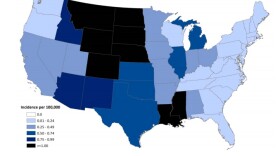Dallas County Health Services as of May 2024 has reported at least 90 mosquito samples testing positive for West Nile Virus.
Controlling the mosquito population is necessary to keep the illness under control, but Dr. Philip Huang, the director of Dallas County Health and Human Services, told KERA’s Sam Baker the weather hasn’t cooperated.
This season with the rains we've had large numbers of mosquitoes, I think in May in particular, some of that with the surveillance and, trapping and things that we do, saw some pretty big increases, earlier on.
But I'm also told mosquitoes like the heat?
So for that risk of West Nile virus, it's really sort of a combination of factors, because of the way that West Nile virus is transmitted and transmitted to humans. It's actually, in the bird population.
And so, when there's drought and limited water supply, sometimes the birds and mosquitoes are in the same areas, and then you get more mosquitoes biting those birds getting infected than they can transmitted to humans. So it's this combination of factors that can account for increased West Nile virus in our human population.
Dallas County has been reporting a lot of samples from mosquito traps and pools. It's positive for West Nile virus of late.
Yes. Although this season thus far is not that atypical from what we see from season to season, but we're watching it very closely.
What do you do after making those positive samples?
So we work with the communities and have some agreements to do some ground spraying, around those areas, probably in different zones, about a mile around where the positive trap had been identified.
Why not spray the county as a whole on a regular basis?
Well, these are areas that have specifically been identified as having mosquitoes that are testing positive for West Nile virus. It would be higher risk. So we want to make sure and get those areas in particular.
Also, we have teams that go out and look for other higher-risk areas where we can put out some dunks. And if there are pools of water that might be breeding grounds for mosquitoes, and also try to get the message out, for people to watch and do everything they can to avoid mosquito bites.
What should they do?
The four Ds:
- The first D is for Deet or another EPA approved mosquito repellent. You know, whenever you're outside, try to use that repellent.
- The second D is for dress. Wear long sleeves and long pants or loose and light-colored clothing.
- The third D is for drain for draining any standing water where mosquitoes can lay their eggs and, breed.
- And, the fourth D is dawn, dusk, when mosquitoes are most active and some of these mosquitoes are active, dawn, dusk and nocturnal biters.
The danger of mosquitoes around this time is certainly linked to West Nile virus. But there's more than that to worry about with mosquitoes?
Yes. I mean, there are other mosquito-borne conditions and diseases that we deal with. You know, you might remember Zika virus and dengue fever. Chikungunya is also one of them.
So you never know what's happening when you come in contact with a mosquito?
Right. I mean, that's what you know. I mean, when you think about it, that something as seemingly innocuous as a mosquito bite, could cause, you know, really severe illness, particularly for a West Nile virus.
We say about 80% of the, you know, people who might have infection then are asymptomatic or, you know, really mild illness, but about 20% get a West Nile fever, febrile illness. But then less than 1% get severe neuro-invasive disease, which can be very serious. And again, about 10% of those, can lead to death.
RESOURCES:




